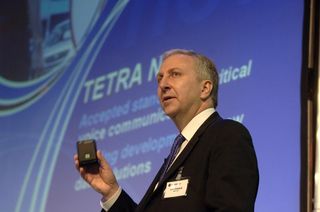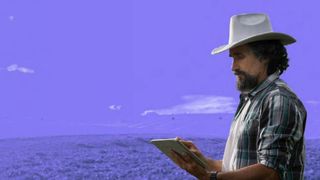Motorola celebrates 10 years of TETRA
The communications giant is celebrating ten years of success since it was awarded the first commercial contract to support a Norwegian deployment of TETRA

Motorola today took centre stage with the TErrestrial Trunked RAdio (TETRA) Association and the Police Information Technology Organisation (PITO) to celebrate the tenth anniversary of the world's first commercial TETRA contract, against the backdrop of a promise to continue to innovate going forward.
Back in 1996, the communications giant won a deal to support the technology at Oslo's Gardermoen Airport in Norway.
The actual contract was signed in September of that year, but the organisations chose today to look back at the technology's history and talk about what users can expect in the next decade.
"TETRA for me for the last ten years has been all about interoperability with ourselves and others," said Phil Kidner, chief executive of the TETRA Association, which represents more than 140 organisations in over 35 countries.
"Ten years ago, I was a police officer walking up and down the street with a big radio. A police car would be going up and down that same street but we couldn't talk to each other because we had different radios on different frequencies. And if the fire service turned up we couldn't talk to them either unless we'd pre-planned it, which was a terrible state of affairs."
That has now changed and there is much more interoperability, thanks in the main to industry players working together, according to Kidner.
But there is still much to be achieved and interoperability, in addition to lobbying governments to make available more dedicated TETRA spectrums, will be central to the technology's successful evolution.
Get the ITPro. daily newsletter
Receive our latest news, industry updates, featured resources and more. Sign up today to receive our FREE report on AI cyber crime & security - newly updated for 2024.
"There are other technologies. WiMAX is one, DMR is another. Will TETRA compete with these? I don't think that it should," Kidner added.
Motorola agrees with Kidner's last point.
The company will continue to innovate and build on its TETRA capabilities as well as supporting augmenting technologies such as WiMax or MESH, according to John Gherghetta, Motorola's corporate vice president and general manager for Networks and Enterprise, Europe, Middle East and Africa (EMEA).
"We've been doing this for a long time," he said.
"A lot of evolution has happened in that time and a lot more will come from this. Our innovation is part and parcel of every mission-critical workforce in the world and we are constantly evolving and developing [that technology]."
Maggie has been a journalist since 1999, starting her career as an editorial assistant on then-weekly magazine Computing, before working her way up to senior reporter level. In 2006, just weeks before ITPro was launched, Maggie joined Dennis Publishing as a reporter. Having worked her way up to editor of ITPro, she was appointed group editor of CloudPro and ITPro in April 2012. She became the editorial director and took responsibility for ChannelPro, in 2016.
Her areas of particular interest, aside from cloud, include management and C-level issues, the business value of technology, green and environmental issues and careers to name but a few.





